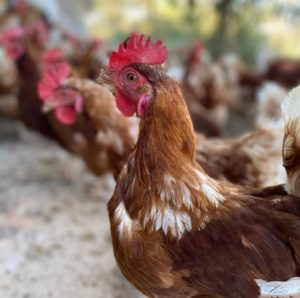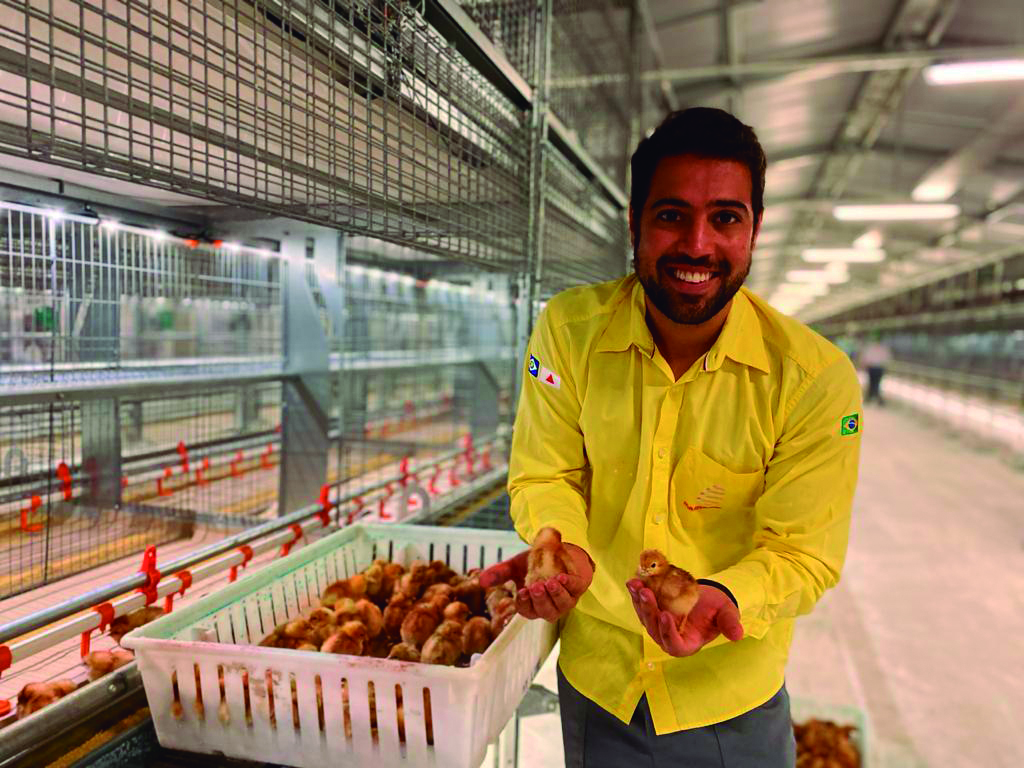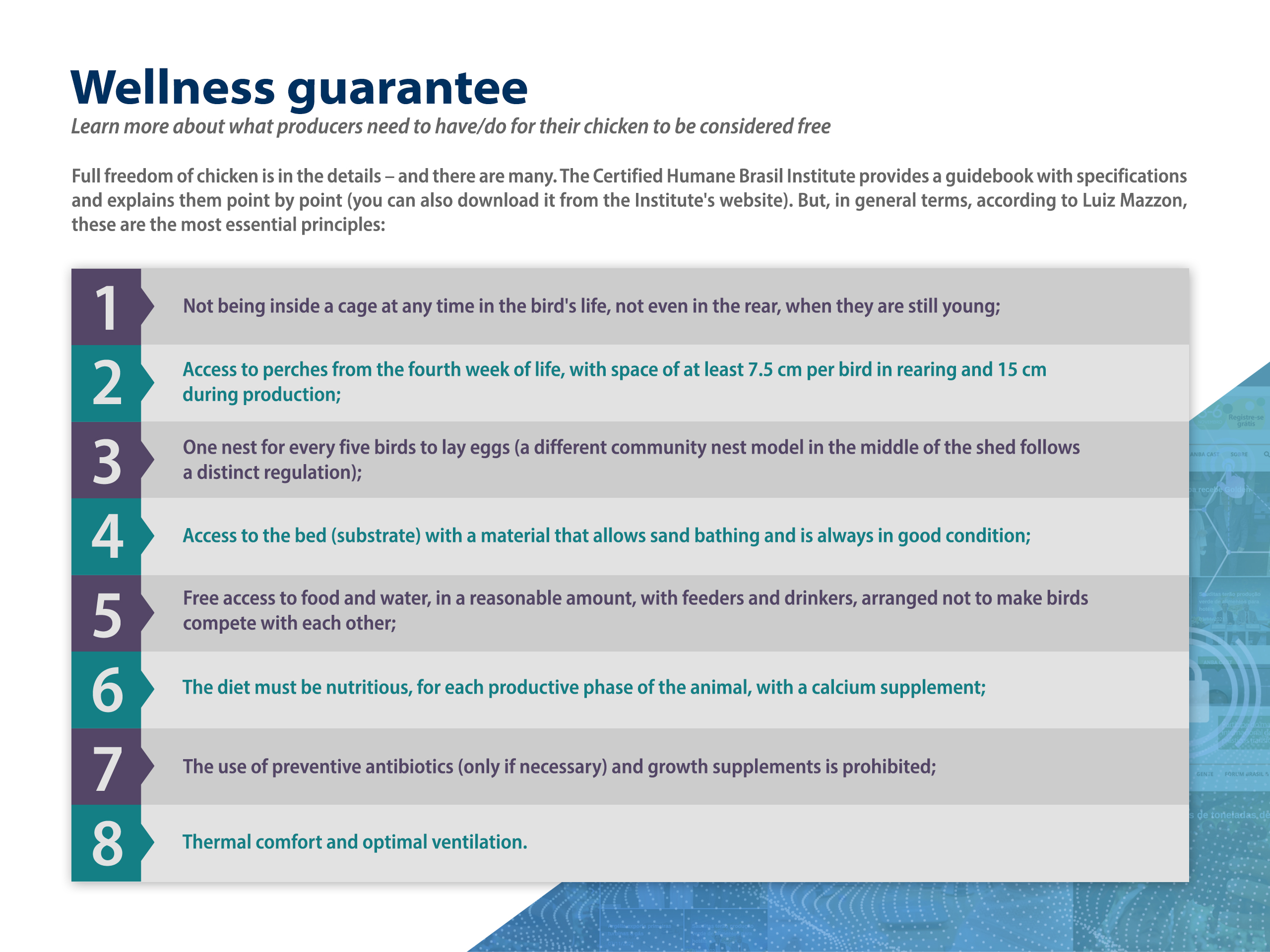São Paulo – You probably have noticed on the supermarket shelves how egg-laying chickens are increasingly free and happy. Terms like “cage-free”, “happy chickens” and “animal welfare” have appeared more and more on egg packs. A booming market around the world, eggs laid by birds that have their natural behavior respected is a rising trend in Brazil — to a point of no return. Although it’s still small, accounting for approximately 4% of total eggs produced in Brazil, the number of farms that want to free their chickens from the traditional old-fashioned model and farms that are already created respecting the animal welfare have grown. Pictured above, Murilo Pinto of egg producer Mantiqueira.

Luiz Mazzon, director-general of Certified Humane Brazil, the South American arm of the Humane Farm Animal Care, created in the United States, confirms the growth. When it started, back in 2016, Certified Humane was the sole certifying body of animal welfare (free-range chicken eggs). Six years later, it welcomes an average growth of 20% in the quarterly egg output in all certified farms in Brazil. Certified Humane has certified 81 farms and 3.5 million birds in the country. There are many people producing uncertified free-range eggs, which is no guarantee that they follow the basic principles of the institute (see below).
One of the certified eggs is produced by Fazenda Speranza, based in São Sebastião do Oeste, Minas Gerais. “Our first egg was already born with a certification,” Guilherme Henrique Diniz Baruffi says proudly. In 2017, he started the production with just over 3,400 eggs. Now they are almost 40,000 of different types (“We’re running tests”) that produce around 32,000 eggs a day. Baruffi, 34, was born in Belo Horizonte and holds a degree in automotive engineering. Since he was little, he dreamt on having a farm, and when he was older, he started seriously considering moving from the car industry into farming, for the desperation of his father, who was raised in a farm in Santa Catarina in a family whose patriarch, his Nonno, did everything in his power to ensure that no one would live from the land ever again.

Baruffi wanted to go back to his family roots but in a contemporary type of way. “I wasn’t quite sure of what I wanted to produce; I just knew I wanted it to be something sustainable that respected the animals and the environment. Then I visited Fazenda da Toca (a free-range chicken egg farm in the state of São Paulo), and I fell in love with what they did there and the concept of agriforest,” he said. Finding the perfect farm wasn’t easy. After a couple years searching a reasonably priced farm in the outskirts of Belo Horizonte, he finally found his land in the town of Divinópolis. “There wasn’t much around here but the basics we needed: It’s flat, it has water, and it’s close to the road.”

Besides caring for the welfare of the chickens, Baruffi strives to be an impeccably sustainable farmer: 25% of the farm has been reforested, respecting environmental protection areas and legal reserves; the top of the hills is covered in green; the areas close to the rivers are surrounded; and the water come from cisterns, thus ensuring the preservation of groundwater. No herbicides are used there. Its welfare concern is also human. The entrepreneur trains local workforce and pays above-average salaries. Of the twelve employees, all formal, over half are women. And it’s the least hierarchical relation possible: There’re only three levels, and all have access to the owner. Speranza’s eggs are sold in markets in Belo Horizonte and Divinópolis, but he wants to grow, expand and export. “We were asked to sell to Thailand, but we still hadn’t the documents back then.”
Thailand, Mazzon says, is the sole country to have a norm on cage-free chickens. Brazil only has a legislation on organic eggs, which is more focused on the chickens’ feed than their welfare, and there is no bill in this regard. Pressure comes from other places like the foreign market, more demanding up-to-date consumers, the industry that uses eggs in their products (pressured by both the foreign market and more demanding up-to-date consumers). Food-retailer GPA has announced that all eggs on its shelves will be free-range by 2028. Heinz only uses this type of egg in its mayonnaises. Pastas produced by Barilla in Brazil are also cage-free.
The king of the farm
A different path from Speranza’s was taken by Mantiqueira, South America’s largest egg producer. If Baruffi’s farm was already born certified, the business created by Minas Gerais’ Leandro Pinto’s in the 80s, had to adapt to changing times. In 2020, the firm signed the Compromisso Mantiqueira, a pledge to have 2.5 million cage-free chickens by 2025 and not building any old-fashioned farm from then on. There are now just over 1 million cage-free birds out of the company’s 14 million. The Happy Eggs line has the Certified Humane certification and caters only to the domestic market for now, although Mantiqueira exports its conventional eggs to Japan, Hong Kong, and countries in Africa and the Middle East (exported eggs are breaker and powdered). Exports account for 4% of the sales.

Out of the 21 farms across five Brazilian states, seven operate with two different production models: Cage-free exclusive and hybrid. The one in Lorena, São Paulo, built in 2020, is the company’s favorite. “It’s unique in the country. It was planned to operate sustainably, with solar power and biogas production from chicken manure,” Murilo Pinto explains, the company’s commercial director and Leandro’s son. “We’re implementing an electric truck fleet to transport the materials and a pioneering water and sewage system treatment.” The nests in Lorena are automated, taking the eggs to a belt that falls directly into the sorting stage, with no human contact.
In early December, Mantiqueira acquired Fazenda da Toca, the same one where Baruffi did his training. Toca, created by Pedro Paulo Dinis, son of Abílio Diniz, creator of the GPA, is Brazil’s largest organic egg producer. “We believe in this change in consumer thinking and buying habits, so we are prioritizing more and more products and brands that promote the animal welfare and environmental care across the production cycle,” Murilo Pinto finishes.
Report by Débora Rubin specially for ANBA
Translated by Guilherme Miranda & Elúsio Brasileiro





